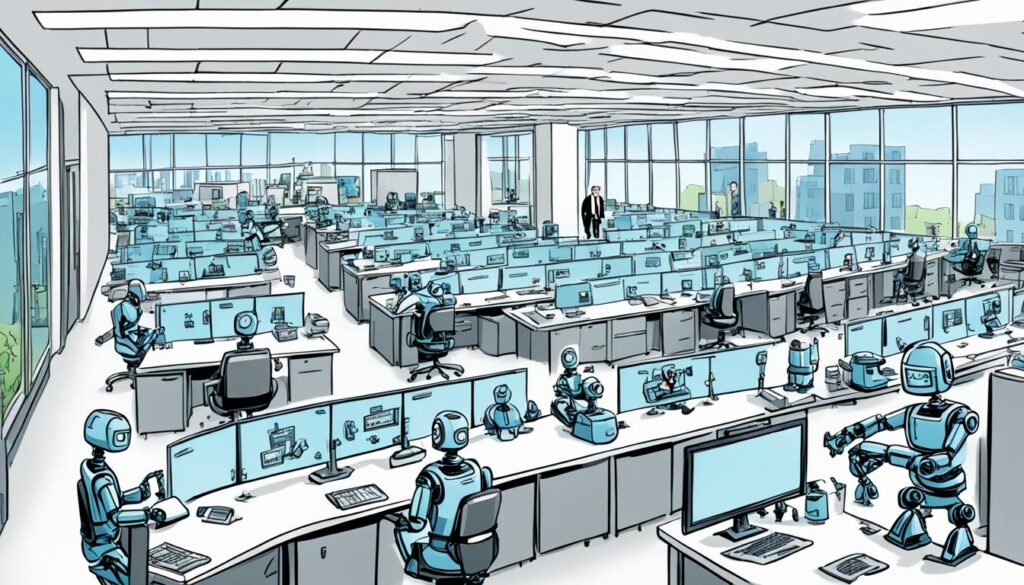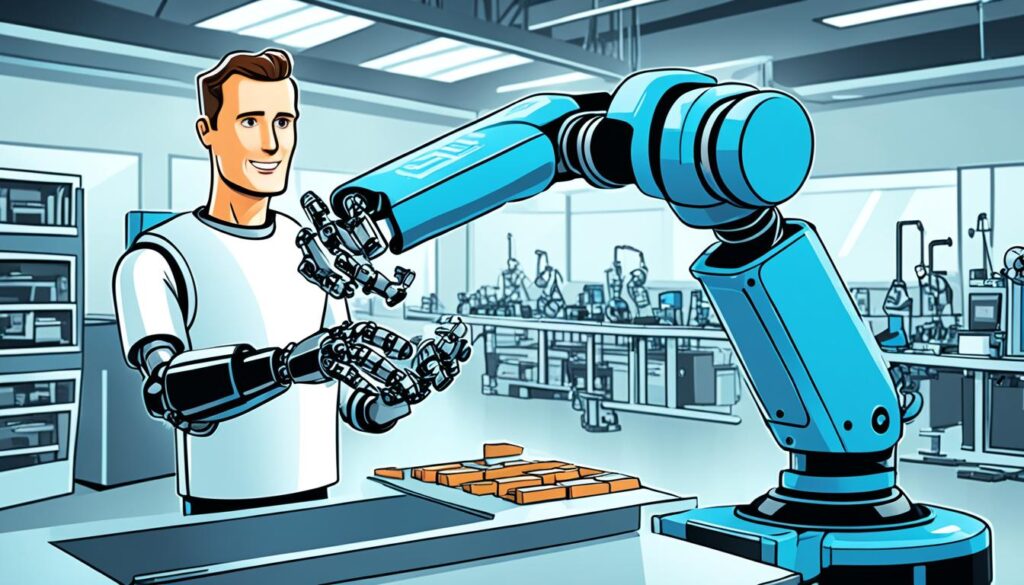Did you know that 15% of U.S. worker tasks are now done faster with AI tools? This shows how fast technology is changing jobs and work. As AI changes the workforce, it makes us think about how it will affect human jobs and the need for new ones.
Artificial intelligence is changing the job market fast. Experts say AI could make nearly half of all job tasks easier in the future. This change is exciting but also makes people worried about their jobs.
In this article, we’ll look at five things AI will likely make outdated soon. We’ll talk about new careers and chances that come with this change. Get ready to learn how to keep up in an AI-driven world.
The Rise of Artificial Intelligence in the Workplace
Artificial intelligence is changing the workplace fast. It’s reshaping the future of work, bringing big changes to the workforce. As companies use AI, both good and bad changes are happening in different areas.
Current AI Adoption Rates
AI use in business has grown by 270% in the last four years. Now, 90% of top companies are using AI. They’re doing this because AI can make them more productive, and over half of them say it has already helped them work better.
Projected AI Integration by 2025
By 2025, AI will have a big effect on jobs. The World Economic Forum says AI could replace 85 million jobs. But, it also predicts the creation of 97 million new jobs because of AI, which means more jobs overall.
Executive Perspectives on AI’s Impact
Top executives see AI changing their jobs and companies. A survey shows 92% of them are using AI. They think it’s important to get better at AI skills soon. Also, 56% think AI might take over some or all of their jobs, showing how big AI’s impact will be.
As AI keeps getting better, we’ll need to be flexible and learn new skills. Some jobs might disappear, but new ones will come up in areas like AI development and working with AI.
5 Things That AI Will Make Obsolete
AI is changing the job world, making some jobs less needed. You might be curious about which jobs are at the most risk. Let’s look at five jobs that AI might replace soon.
Data entry clerks are likely to become obsolete first. AI can process data much faster and more accurately. Telemarketers are also at risk, as AI chatbots can talk to customers better.
Jobs in factories are changing too. Automation and robots are doing the repetitive work, freeing humans for more complex tasks. Cashiers are also facing changes, with more self-checkout systems in stores.
Drivers, like truck drivers and taxi operators, might see their jobs change. Self-driving cars could replace human drivers in the future.
- Data entry clerks
- Telemarketers
- Factory workers
- Cashiers
- Professional drivers
These changes might seem scary, but AI is also creating new jobs. It’s important to learn skills that work well with AI. This way, you can keep up with the changing job market.
Data Entry Clerks: A Profession at Risk
The rise of artificial intelligence is changing the job market. Data entry clerks are facing the impact of ai job displacement. AI systems can now quickly and accurately extract and analyze data, making manual entry less needed.
AI’s Data Processing Capabilities
AI can handle huge amounts of information fast and accurately. This is changing how businesses manage data. Tasks once done by data entry workers are now automated:
- Extracting information from scanned documents
- Inputting data into databases
- Verifying and cross-checking information
Job Growth Outlook
The future looks tough for data entry clerks. Experts predict up to 7.5 million data entry jobs could disappear by 2027. This shows the big impact of automation on this job.
Career Transitions for Data Professionals
Even with a tough outlook, data entry workers can move to new roles. By learning new skills, you can find exciting jobs in:
- Data analysis
- Data management
- AI system maintenance
These areas use your current skills but also require new ones that work well with AI. Adapting to this change can lead to better and more stable jobs in an AI world.
The Transformation of Customer Service Roles
Customer service is changing a lot because of AI job threats. Telemarketers are at high risk of losing their jobs to AI. This is because AI tools that understand language are getting better.
Now, AI chatbots and virtual assistants are taking over customer service. They handle customer interactions very well.
Even with these changes, the human touch is still important in many roles. A recent survey showed that 88% of people still like talking to a human over a chatbot. Only 35% found chatbots helpful in solving their issues, and 77% found them frustrating.
To keep up, customer service workers should focus on:
- Developing emotional intelligence
- Improving complex problem-solving skills
- Looking into customer relationship management roles
- Specializing in giving personalized customer experiences
AI is changing the industry, but it’s also opening new doors. By accepting these changes and updating their skills, customer service workers can do well in an AI-driven world.
Manufacturing and Factory Work in the Age of AI
The manufacturing sector is going through big changes thanks to AI and robotics. These changes are making factory floors look different and changing jobs for many workers.
Automation and Robotics in Manufacturing
AI-powered robots are now doing repetitive tasks on production lines. This is making people worry about losing jobs in traditional factory roles. An IMF report says 40% of jobs worldwide could be hit by AI, and that number could go up to 60% in richer countries.
Shifting Roles for Factory Workers
With machines doing more work, factory workers are moving to new jobs. You might end up in quality control, logistics management, or programming robots. These new jobs need new skills and the ability to adapt.
Emerging Opportunities in Mechatronics
The rise of AI in manufacturing is creating new job chances. Mechatronics, which mixes mechanics, electronics, and computing, is growing fast. If you work in manufacturing, think about looking into careers in:
- Robotics maintenance
- Automated system design
- Industrial IoT implementation
These jobs often come with better pay and job security. While AI is changing manufacturing, it’s also opening up new career paths. By embracing these changes, you can find growth and success in the changing manufacturing world.
The Future of Retail: Self-Checkout and Automated Stores
The retail world is changing quickly. Self-checkout and automated stores are becoming more common. These AI technologies are changing how we shop. They offer convenience but also lead to some jobs being replaced by machines.

Self-checkout systems are now common in many stores. They let you scan and pay for items on your own. Over time, they have replaced many cashier jobs. However, some stores are reducing self-checkout due to theft and customer complaints.
Automated stores take this idea even further. Companies like AiFi are creating systems that can run stores without any human staff. These stores use AI to track customers and inventory. They provide a smooth shopping experience and give retailers valuable data.
- Self-checkout limited to small purchases in some stores
- Automated stores use AI for inventory tracking
- Retailers balancing tech with human touch
Even with more automation, humans still have a place. They are needed for complex situations and personalized service. Retailers need to find the right balance between AI efficiency and human interaction.
Looking ahead, we’ll see more AI in retail. From predictive analytics to virtual shopping assistants, technology will keep changing how we buy and sell goods. The future of retail is here, and it’s getting more automated.
Transportation Industry Disruption: Autonomous Vehicles
The future of work in transportation is changing fast with autonomous vehicles leading the way. This technology is set to change the industry a lot, affecting jobs and creating new ones.
Timeline for Widespread Adoption
Fully autonomous vehicles are not yet common, but progress is steady. By 2040, self-driving cars could be 25% of the global market. Companies like Waymo and Uber are testing millions of miles, making the way for wider use.
Impact on Professional Drivers
The rise of AI could lead to big changes in jobs. With 94% of U.S. car accidents caused by people, autonomous vehicles could make roads safer. This change might affect jobs for truckers and taxi drivers.
New Career Paths
As the industry changes, new jobs are coming up:
- Fleet management specialists
- Logistics coordinators for autonomous fleets
- Technicians for autonomous vehicle maintenance
The future of work in transportation will need people to adapt to these new roles. While some jobs might go away, others will be made, changing the workforce in this evolving field.
White-Collar Jobs Facing AI Transformation
AI is changing white-collar jobs in many industries. Studies show that 37% of business leaders are now using AI to replace jobs. They expect to cut more jobs in 2024 because AI makes things more efficient.
Goldman Sachs thinks AI will take away 300 million jobs in the U.S. and Europe. Companies are using their savings to invest in AI and automation. This is why big tech companies like Alphabet and Microsoft are slowing down their hiring to focus on AI.

- Management consultants and lawyers still rely on human interaction and problem-solving skills
- HR roles involving conflict resolution and employee relations require human touch
- Data analysis, bookkeeping, and repetitive administrative tasks are highly vulnerable to automation
- AI is taking over writing, media, marketing, legal document drafting, and financial reporting tasks
To keep up, workers need to learn new skills. New jobs are emerging like AI specialists, data scientists, and AI ethics officers. AI won’t replace all white-collar jobs soon, but it will change or eliminate 95% of them by 2035. It’s important to adapt to this change for a successful career.
Skills That Will Remain Relevant in an AI-Driven World
The future of work is changing fast with AI becoming more common. As we move forward, some human skills will be more valuable than ever. Let’s look at the skills that will help you succeed in a world with AI.
Critical Thinking and Problem-Solving
AI is great at handling data, but humans are still unmatched in critical thinking. In the U.S., 15% of jobs could be done faster with AI tools. This means workers need to focus on solving complex problems and thinking strategically.
Emotional Intelligence and Interpersonal Skills
As AI takes over routine tasks, emotional intelligence becomes key. Skills like building relationships, understanding feelings, and communicating well are hard for AI to match. Employers are looking for these soft skills more and more, with a shift towards hiring based on skills.
Creativity and Innovation
AI might help with 47% to 56% of job tasks, but it can’t beat human creativity. Being able to think creatively, come up with new ideas, and innovate will make you stand out in the job market.
To stay ahead in this AI-driven world:
- Keep learning new things to keep up with technology
- Work on your emotional intelligence and leadership skills
- Grow your creativity and innovative thinking
- Focus on solving problems in ways that AI can’t
By improving these skills, you’ll be ready to handle the changing job market and make a big impact in an AI-enhanced world.
Conclusion
The future of work is changing fast, with AI taking over some jobs. Forbes says AI could replace up to 300 million full-time jobs by 2025. But, it’s important to see that it’s not all about losing jobs. McKinsey Global Institute believes AI will add $13 trillion to the global economy by 2030.
As we move forward, remember AI will boost human skills more than replace them. Jobs that need emotional smarts, critical thinking, and creativity are safe from automation. For instance, jobs like therapists, high-level strategists, and investigative journalists need skills AI can’t match.
To do well in this AI world, work on skills that go well with technology. Learn about AI, get better at solving problems, and grow your empathy. By doing this, you can get ready for the changing job market. The future will mix AI’s help with things only humans can do, offering new chances and challenges.
